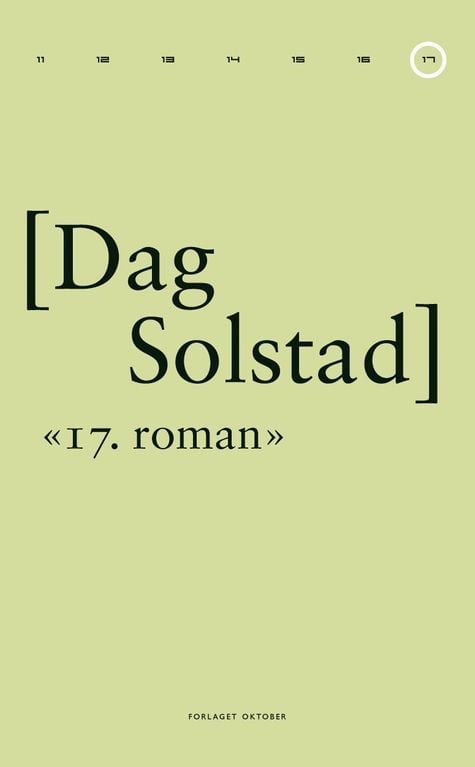”Brilliant Solstad. Finally. After three years, Solstad is back with a new novel, which is always something of an event… this book is packed with Solstadian shrewdness, God knows if it shouldn’t be labelled literary charm… A brilliant novel”
(Aftenposten)
”The seventeenth novel is powerful… [Solstad’s previous novels] should, like this one, be read. And read again … at least as powerful and fascinating as the others, in one great, contradictory forward motion.”
(Klassekampen)
”Solstad is still at the peak of his literary powers … [Bjørn Hansen’s] meeting with his grandson is the novel’s climax, and is so fabulous and so different from what one could expect, that I don’t want to kill any reader’s joy by revealing it … The novel could therefore be called pessimistic – if it wasn’t for Solstad’s unmistakable tone, his soul’s cheerfulness, which somehow strangely manages to turn desperation into triumph.”
(Bergens Tidende)
”When I reviewed Dag Solstad’s Armand V for Dagsavisen autumn 2006, many mocked my historically contingent declaration that Dag Solstad might be the greatest Norwegian writer ever, in any genre. Let me now mock the mockers. When you sit and read aloud, with Kierkegaard in one hand and Solstad in the other, there’s not much different weight. Anybody who can read will feel that.”
(Dagsavisen)
”A fascinating, concentrated tale … the scenes from Bø and the moments between Hansen and his son and daugher-in-law provides Novel 17 with climaxes that match the highest peaks of Solstad’s works … it’s as a novel about a man who feels alone with his God that Novel 17 has great literary power.”
(Adresseavisen)
”Dag Solstad is such a good storyteller … In a direct and efficient manner, with immaculate timing, he constantly conjures up new worlds”
(Dagbladet)
”Solstad’s superior narrative method – his recognizable and completely originial prose combined with the completely unbridled way he plays with his own style – ensures that nothing he writes can be of run-of-the-mill.”
(Dagens Næringsliv)
”As is the case with Philip Roth – another of my permanent candidates for the Nobel Prize – for each new book by Solstad you have to consider his ouevre in whole … [Roth and Solstad] have continued digging where it hurts the most in our manic times … At the end of the day few writers are more preoccupied with contemporary issues than precisely Roth and Solstad … It is their ruthless honesty, their will to follow their own biological and historical clock to the bitter end, bursting with life even in the face of the embarrassment of old age, that will compel us to read them long after the lights have gone out over the Nobel laureates.”
(Expressen, Sweden)
“Solstad writes about [his character] with invariable decency, a kind of virtuous stubbornness: repetitions and variations are essential to this prosaist who sometimes comes across as a Scandinavian Kafka of our time”
(Svenska Dagbladet)
“Dag Solstad fills the day with meaning in another sublime novel on life and ordinariness … Solstad is the unusually gifted writer of the ordinary, and exceptionally so in his newest novel … Solstad’s literary devices are – as always – simple. His sense of style is perfect. Novel 17 is a good place to start. It would be a shame not to”
(Berlingske Tidende, Denmark)
“Grey, sad and dull – what a fantastic novel… With Dag Solstad’s great, little novel on despair, reading feels like a gift … Yet again Solstad achieves a confidance of style and perfect elegance in his Paradies der Plotlosigkeit, a fiction chemically cleansed of traditional drama … [Solstad] places himself as an elegant extension of the masters, particularly Proust, but also Samuel Beckett”
(Information, Denmark)
“Solstad’s new, excellent novel cheerfully tells the story of an aging man who is unconditionally ashamed of himself … Solstad tells this disturbing story … with stimulating humour and intellectual surplus. It is a dark story of shame and about being reserved, carried by the lightest comedy and written in wonderful prose”
(Kristelig Dagblad, Denmark )
“Dag Solstad’s latest novel is world-class nordic literature that represents something as rare as debth without being dull … A literary firework. It is a fantastic book all through … Solstad has already received the Nordic Council Literature Prize. That was in 1989. Damn. If he hadn’t, he would have won it now… There is always the Nobel Prize… He has the quality”
(Veile Amt Folkeblad, Denmark)

